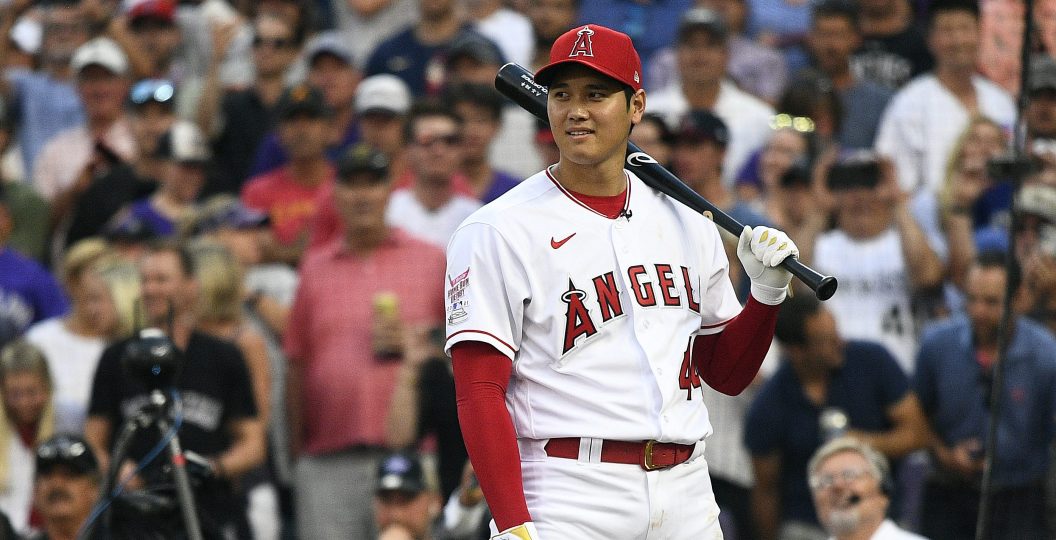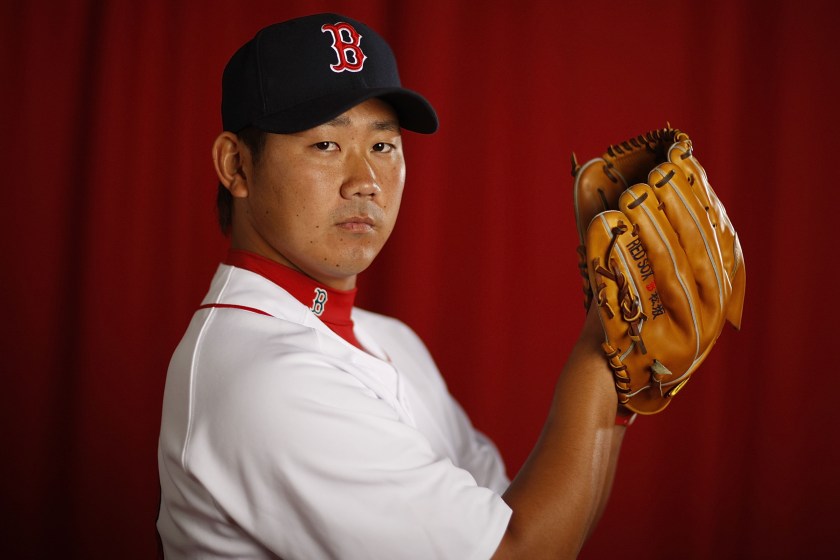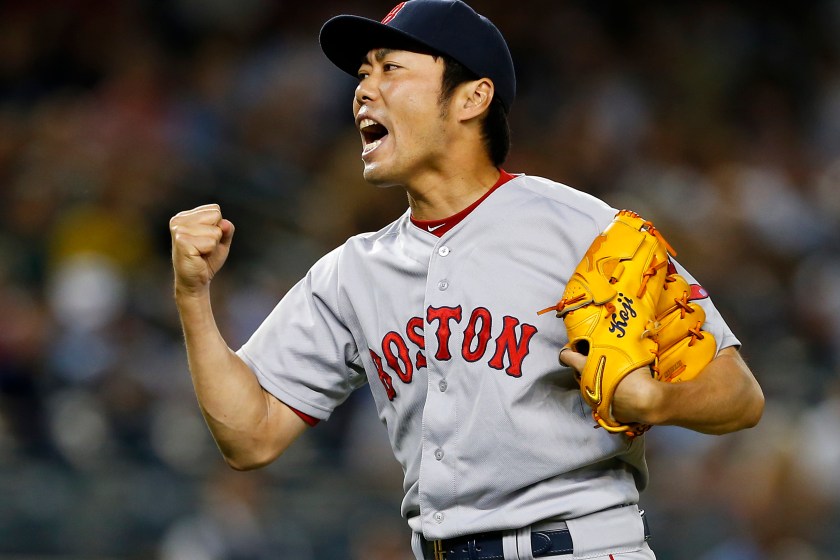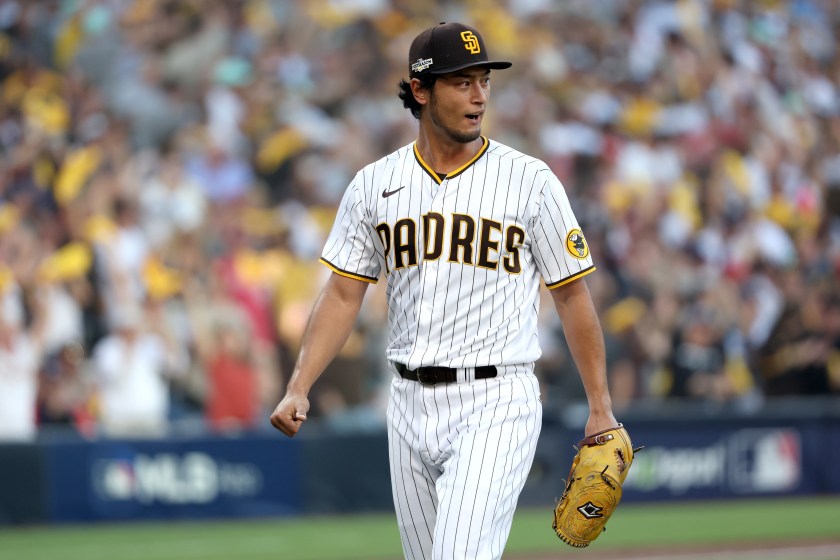Videos by FanBuzz
After San Diego Padres ace Yu Darvish broke the record for most MLB strikeouts by a Japanese player (1,919) on Monday, we got to thinking about where that milestone places him among the best Japanese players in MLB history.
While Japan has long been a breeding ground for many of the world's best baseball players — not to mention biggest superstars — a few players have set themselves apart. But how do they rank among each other? This ranking of the top 10 Japanese players in MLB history should help settle that question — for now.
10. Kazuhiro Sasaki
Our rankings begin with Kazuhiro Sasaki, a closer for the Seattle Mariners from 2000-2004. While Sasaki's MLB tenure was relatively short-lived (he played in Japan's premiere league, Nippon Professional Baseball, for 10 seasons before coming to the States), he did a ton with the time he was given. During his four seasons, Sasaki tallied 129 saves for the Mariners and a 3.14 career ERA. Sasaki also won the AL Rookie of the Year award in 2000 after recording 37 saves that season alone, and he made the All-Star game in both 2001 and 2002.
Kazuhiro Sasaki being ranked 10th proves how impressive the rest of this list is. If he'd come to the MLB a few years sooner, he surely would have ranked higher.
9. Daisuke Matsuzaka
Daisuke Matsuzaka — better known as "Dice-K" — was the most-hyped Japanese player ever to make the jump to MLB upon signing with the Boston Red Sox in 2006. And he lived up to those lofty expectations. In his 2007 rookie season, Dice-K recorded a whopping 201 strikeouts in 204?..." innings. Most importantly, he was integral to Boston winning its second World Series title in four years that season — culminating with him becoming the first Japanese-born pitcher to win a World Series game.
Matsuzaka had a stellar 2008 season, finishing fourth in AL Cy Young Award voting after going 18-3 with a 2.90 ERA and 8.3 strikeouts per nine innings. Unfortunately, Matsuzaka faced multiple injuries after that and could never regain his peak form from 2007-2009. But Dice-K still had an outstanding eight MLB seasons — and lives on in Boston Red Sox folklore.
8. Masahiro Tanaka
In 2014, the New York Yankees signed Japanese pitcher Masahiro Tanaka to a seven-year deal worth $155 million — which was, at that time, the richest contract by far ever given out to a Japanese player. And for the most part, Tanaka lived up to the Yankees' expectations. He went 78-46 with a 3.74 ERA over those seven years, while making 173 starts and remaining relatively healthy throughout that time. Tanaka was an All-Star twice, including in his rookie season, when he posted a 2.77 ERA.
Tanaka's biggest success came in the postseason. In his first seven MLB playoff starts, Tanaka posted a 1.32 ERA and never allowed more than two runs in a start. But that went sour in 2020, after two poor postseason starts — the final of which was a loss in Game 3 of the 2020 American League Division Series, which was the final time Tanaka ever pitched for the Yankees. Still, he had a great MLB career and would be higher on this list if he had ever won a World Series.
7. Hiroki Kuroda
Many Japanese standouts will play an entire career in Japan before coming to the United States — and Hiroki Kuroda is another example of that. Even though Kuroda made his MLB debut at age 33, he still pitched well enough to cement himself as one of Japan's best-ever MLB players. In seven MLB seasons with the Dodgers (2008-11) and Yankees (2012-14), he was one of the most consistent pitchers you'll ever see. He made at least 31 starts in six of the seven seasons, and his ERA remained between 3.07 and 3.76 every single year. What's great about Kuroda is that, instead of overpowering hitters with high velocity and disgusting stuff (which is what most pitchers on this ranking have done), Kuroda relied on weak contact and trusting the defense behind him. While never a fan favorite or big-time superstar, Kuroda's MLB career stands the test of time.
6. Koji Uehara
Like Hiroki Kuroda, Koji Uehara made his MLB debut at age 33 and spent five seasons as a solid relief pitcher with the Baltimore Orioles. However, his career catapulted when he was traded to the Boston Red Sox in 2013. That season, Uehara struck out 101 batters in 73 appearances, recorded 21 saves, finished the year with a 1.09 ERA and 0.565 WHIP, and pitched in 13 of Boston's 16 postseason games while recording seven saves and a win during that span. He was also on the mound when the Red Sox won the 2013 World Series.
Uehara remained in the MLB until 2017, when he finished his career with 95 total saves and 572 strikeouts in 480?..." innings. Like Dice-K, Koji was beloved by Boston Red Sox fans for his postseason success.
5. Hideo Nomo
While there were Japanese-born MLB players before him, Hideo Nomo is considered the catalyst for Japan's introduction to baseball's biggest stage. Upon signing with the Dodgers in 1995, he went on to have one of the best rookie seasons in history — going 13-6 with a 2.54 ERA, 235 strikeouts and just 124 hits in 191?..." innings — which won him the 1995 NL Rookie of the Year Award. Nomo finished fourth in Cy Young voting in both 1995 and 1996, and he finished his 12-season career with a 123-109 record, 1,918 strikeouts — which was the previous record for most strikeouts by a Japanese pitcher before Darvish broke it on Monday — and nine shutouts.
Yet, Nomo is best known for his legendary delivery. Countless kids over the years have mimicked Nomo's windup, which started with the arms stretched high, leading into the complete back turn away from home plate before throwing. This delivery alone turned Nomo into a household name — but his career stats back up that chatter.
4. Hideki Matsui
If you haven't yet noticed, every player on this list (so far) has been a pitcher. That ends with Hideki Matsui. As soon as he was signed by the Yankees in 2003, Matsui's ability to produce runs was a dream come true for the Bronx faithful. He drove in over 100 RBIs in four of his first five seasons with the club, and he only missed out in 2006 because he was injured for over half the season.
But Matsui's legend stems from the 2009 World Series. During those six games, Matsui batted .615 — yes, you read that right — with three homers and eight RBIs. It was a performance that won him World Series MVP after the Yankees won the championship. In fact, Matsui made a career out of performing when it mattered most, finishing with a career .312 average, 10 homers and 39 RBIs in 56 career postseason games. Matsui is so beloved by Yankees fans that many of us (guilty as charged) believe Matsui's No. 55 should be retired by New York. It hasn't yet — but here's to hoping.
3. Yu Darvish
Once his career concludes, Yu Darvish will likely have broken every Japanese-born MLB pitcher's record — which is insane, considering that he pitched 1,268?..." innings in Japan before coming to the MLB at age 25. But Darvish has been sensational since he arrived stateside.
After an excellent 2012 rookie season, Darvish struck out an MLB-best 277 batters and finished as the AL Cy Young Award runner-up in 2013 with the Texas Rangers. After making it to his third straight All-Star game in 2014, Darvish dealt with arm issues that cost him a couple seasons. He returned to form in 2020, finishing second in the NL Cy Young race with the Chicago Cubs.
As it stands, Darvish's career looks like this: a 103-82 record, 3.55 ERA and 1,919 strikeouts (with more to come) in 1,608 innings — plus five All-Star selections. Whenever he decides to call it quits, Darvish will finish his career as the best Japanese-born pitcher in MLB history.
2. Shohei Ohtani
You knew this was coming. Despite wanting to give this two-way superstar the top ranking (since he might be the greatest baseball player ever), Shohei Ohtani takes second because his career is just getting started. But even if his career ended today — knock on wood — Shohei has produced two of the best MLB seasons we'll ever see. In 2021, Ohtani won the AL MVP after hitting 46 home runs, driving in 100 runs and stealing 26 bases while also going 9-2 with a 3.14 ERA on the mound. One year later, Ohtani has slightly less-impressive hitting stats but is vastly improved as a pitcher, going 15-9 with a 2.33 ERA and 219 strikeouts in 166 innings. While he didn't win MVP in 2022, he's still considered the world's best all-around baseball player by a wide margin.
Ohtani will go to more All-Star games (he's already been to three), and he will win more MVPs, more Silver Sluggers and more of just about every other award there is to win. And he'll finish his career not only as the best Japanese MLB player but also perhaps the best MLB player, period. The only question is whether he'll ever win a World Series ring.
1. Ichiro Suzuki
With Ohtani going No. 2, this list could only end with one man. Ichiro Sukuzi is — as of today — the best Japanese baseball player in history. The Seattle Mariners legend won the AL MVP and Rookie of the Year award in his first season (2001), after hitting .350 with 56 stolen bases, 242 hits, and scoring 127 runs. He topped 200 hits each of his first 10 seasons in the majors, made the All-Star team and won a Gold Glove each of those years, plus three Silver Slugger awards in that time.
In Suzuki's MLB career, he knocked 3,089 hits, hit .311, stole 509 bases and scored 1,420 runs, and he is guaranteed to be inducted into the MLB Hall of Fame when he becomes eligible in 2025. But his MLB tenure only tells half of Suzuki's story. Combined with his Japanese statistics, Suzuki has 4,367 career hits, which is the most professional hits of all time.
Ichiro's legacy is set in stone. And players like him, Nomo and the other older guys in this list paved the way for Japanese stars including Darvish and Ohtani to dominate modern-day baseball. And what's most exciting of all is that we're sure to see more Japanese talent coming to the MLB in the future. But let's not get foolish and expect to see more players like Ohtani. He's a unicorn.



